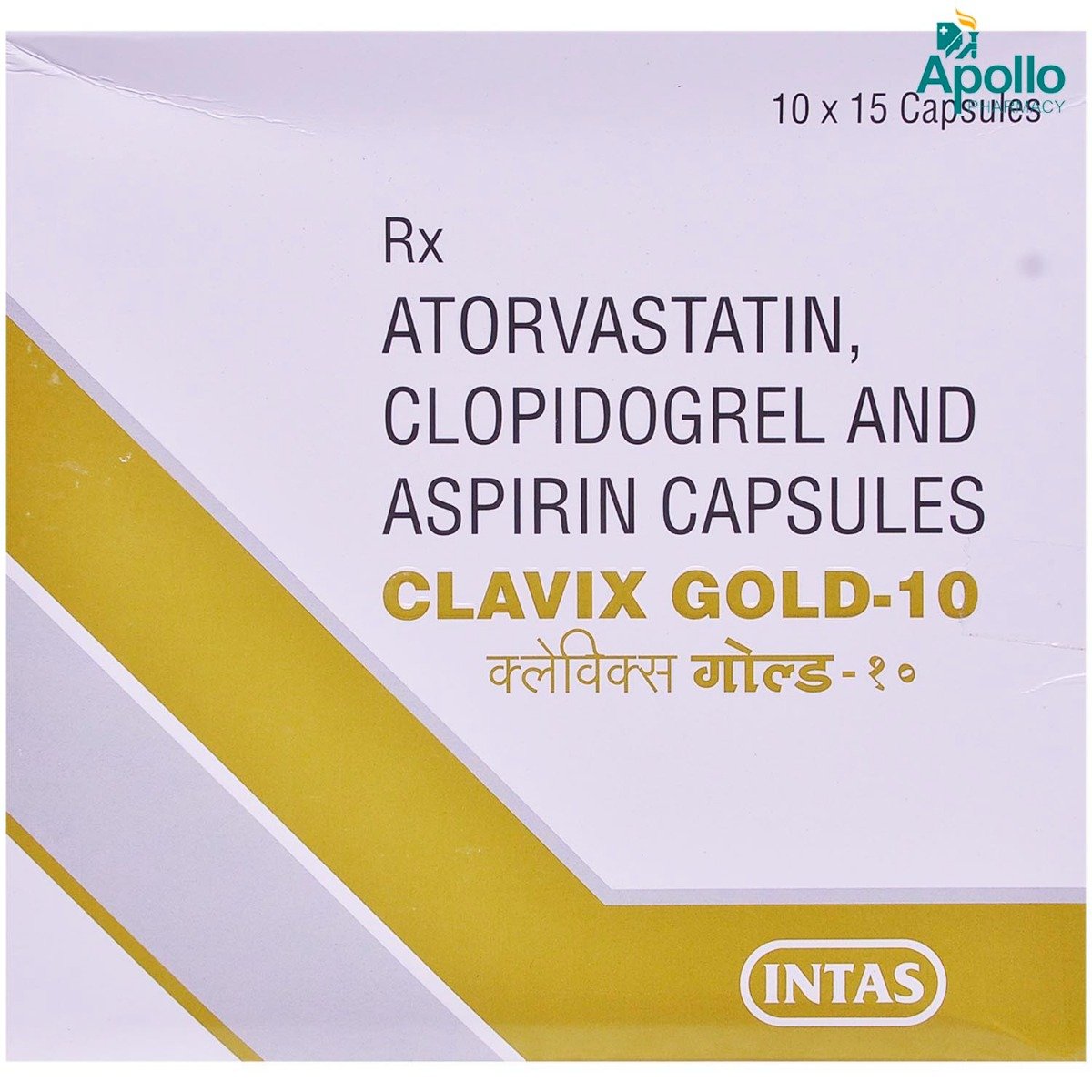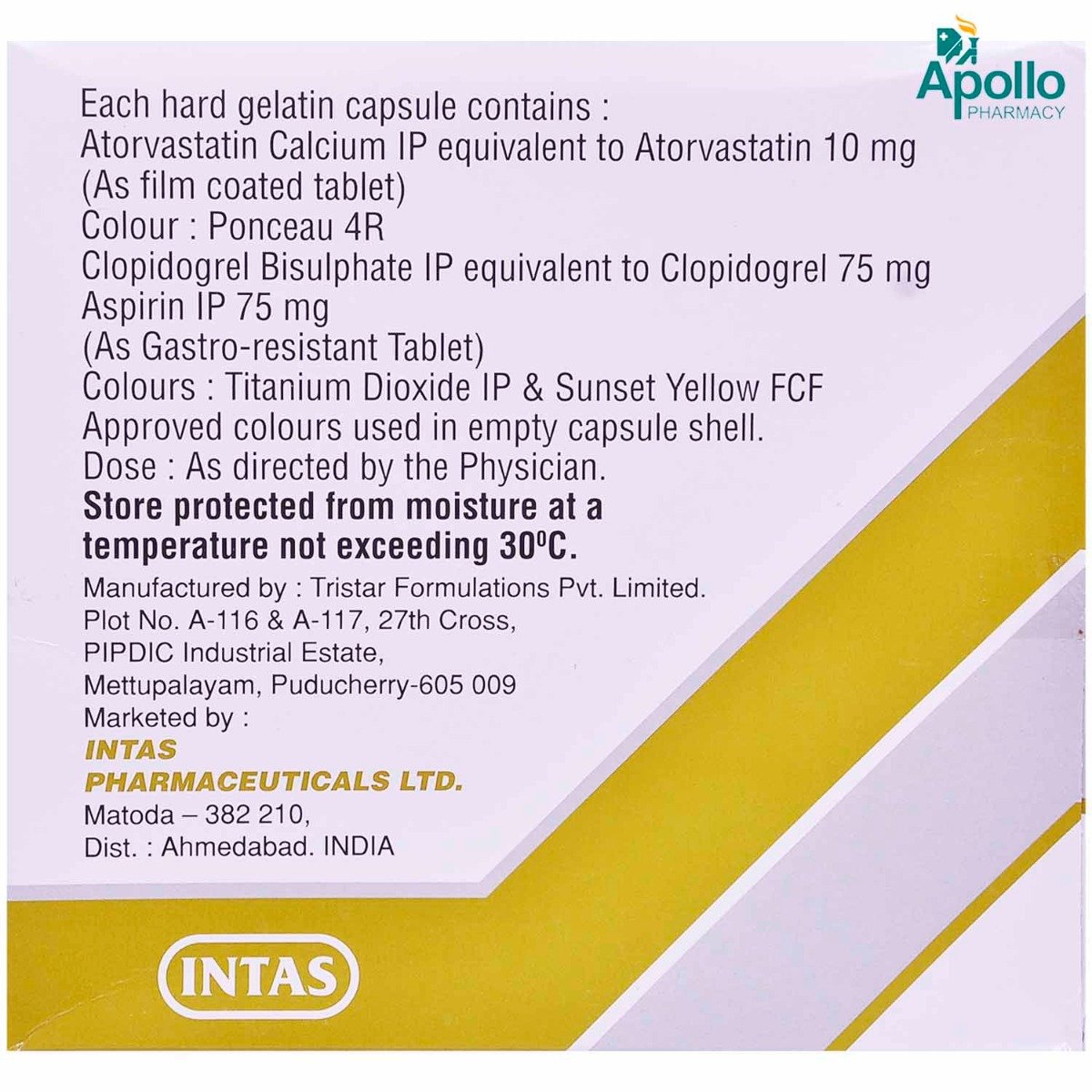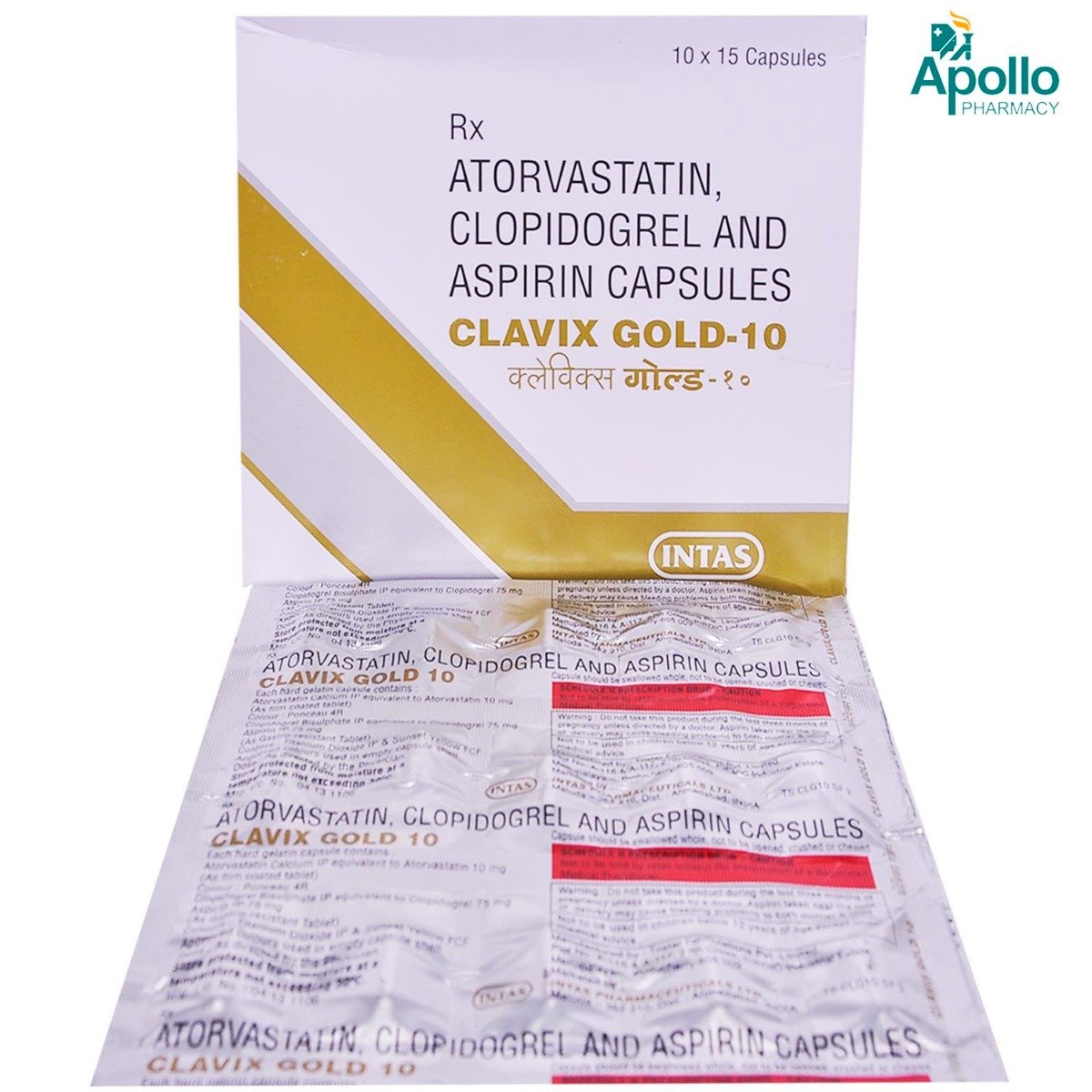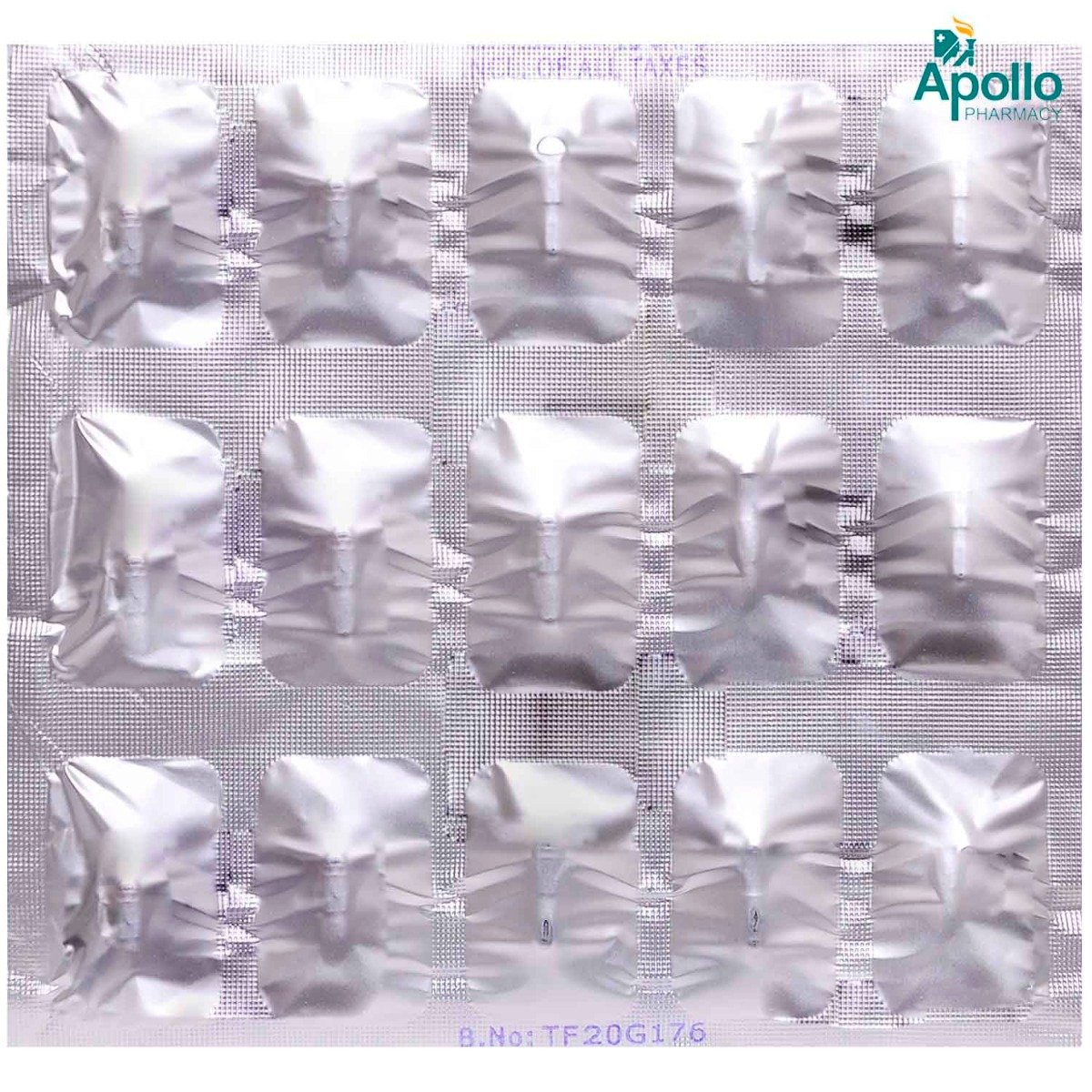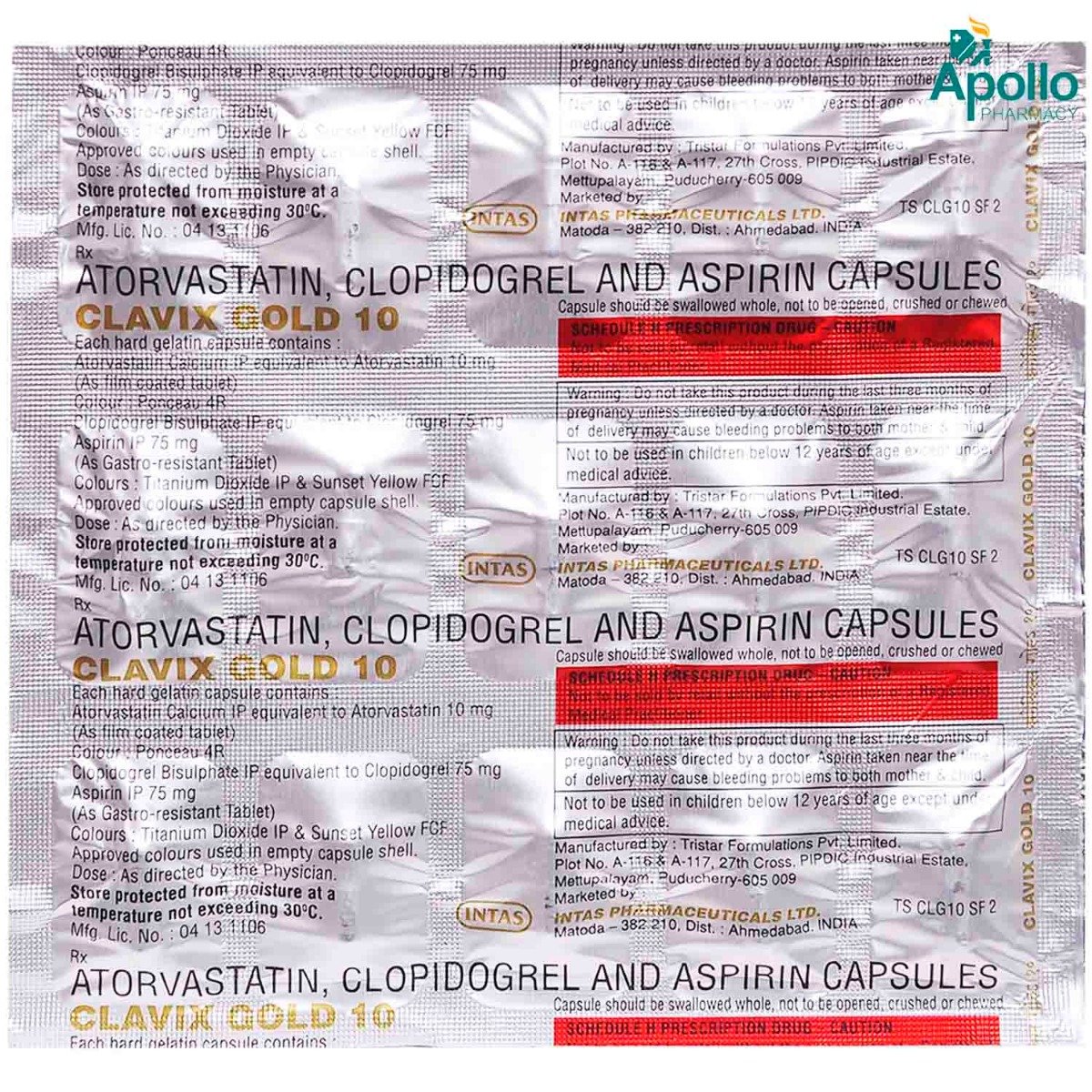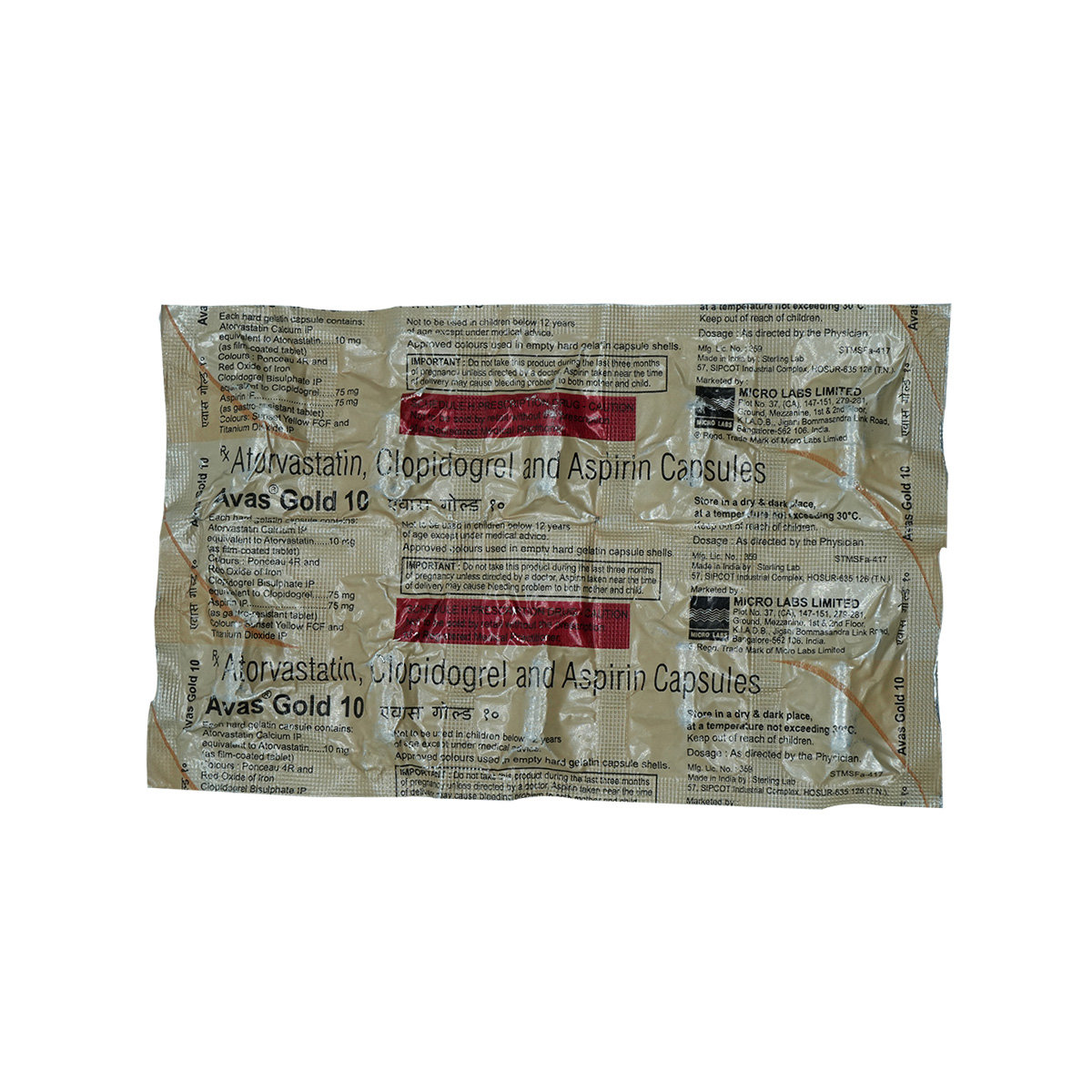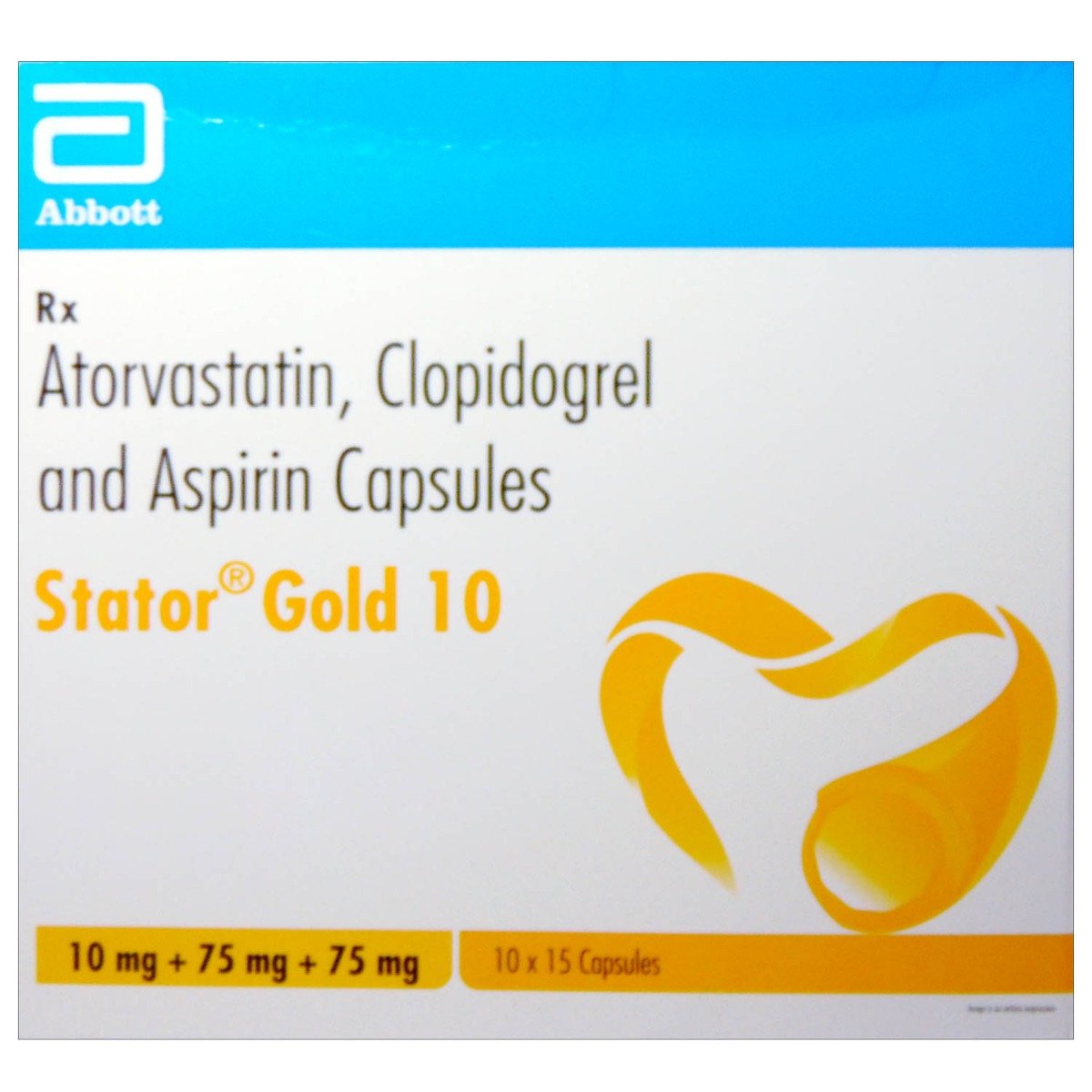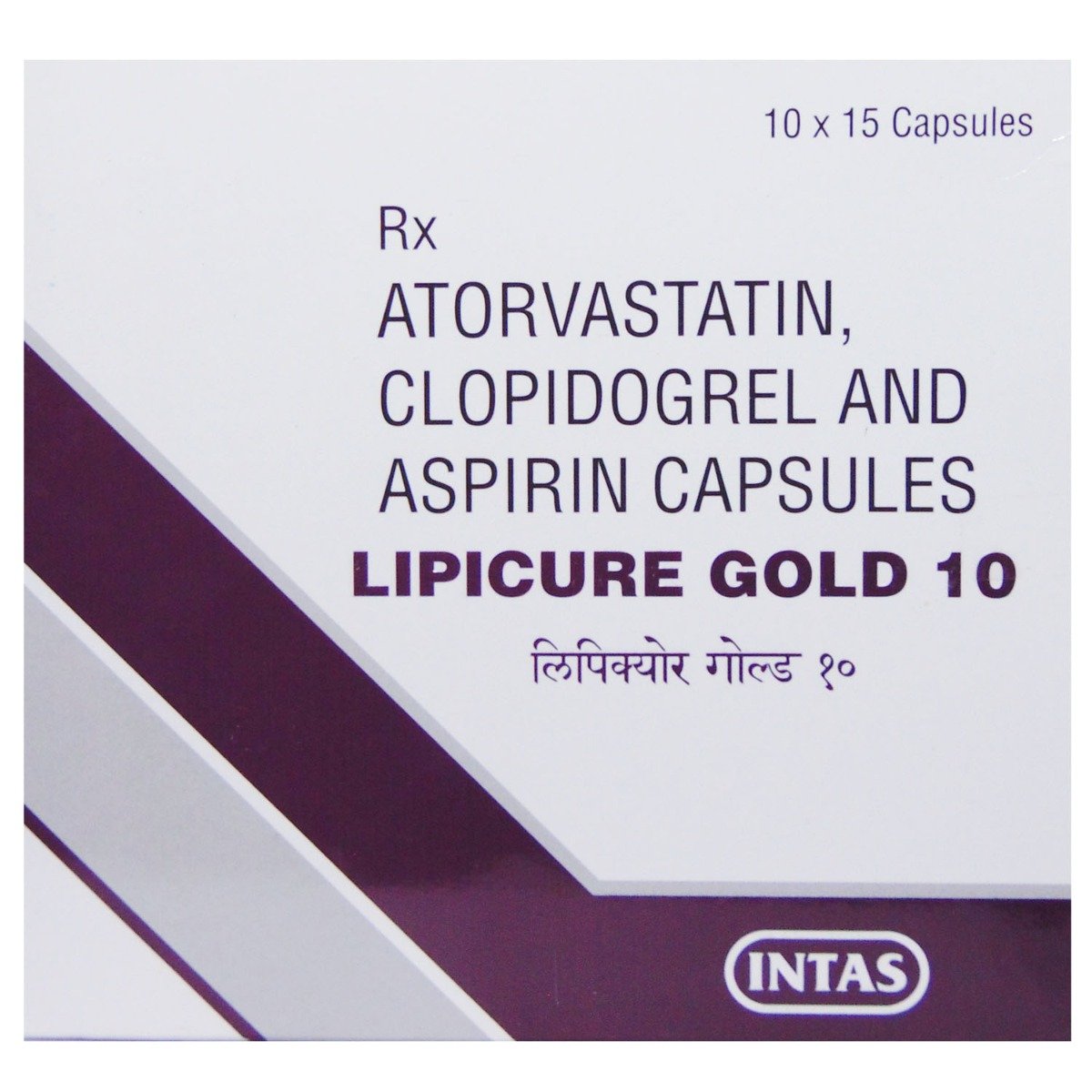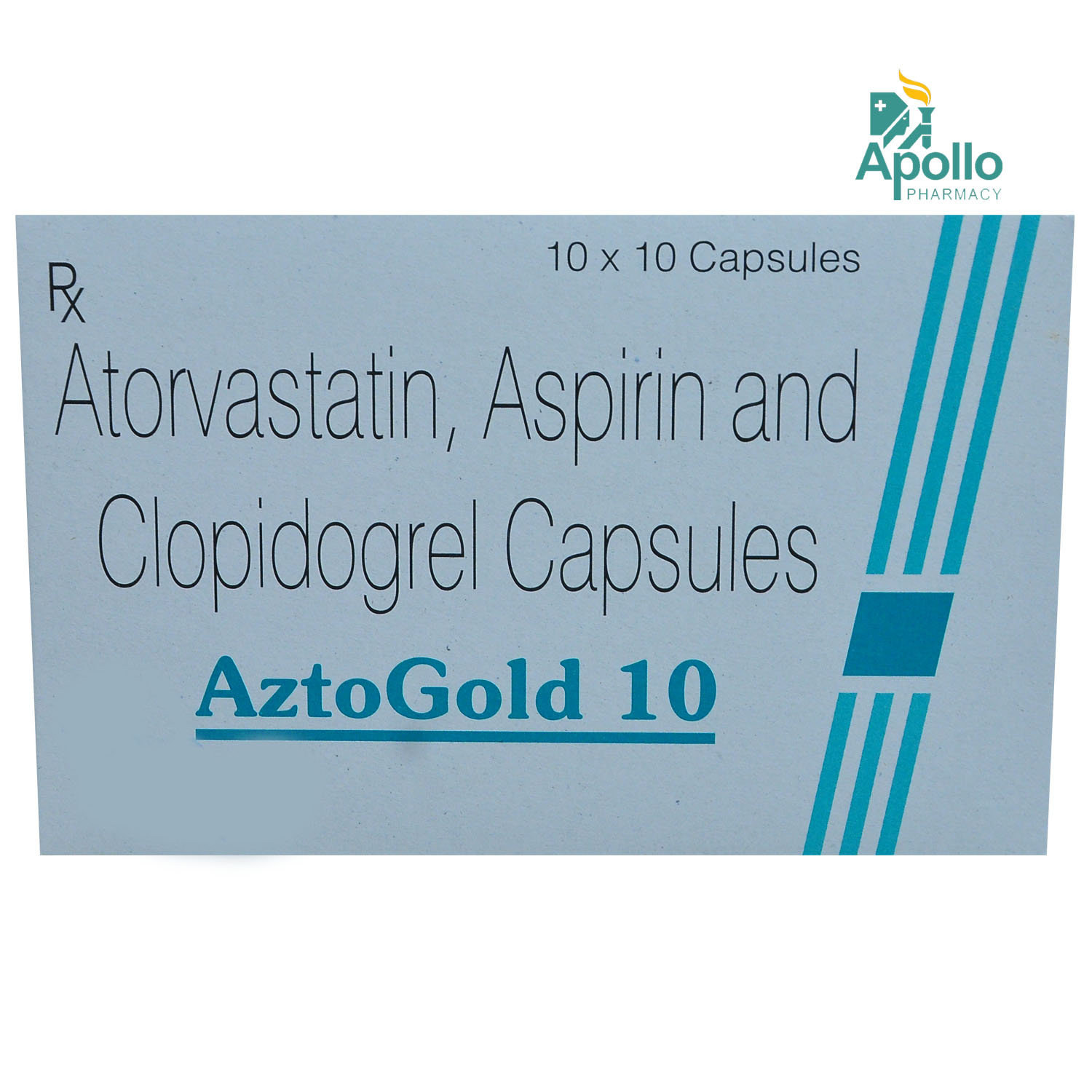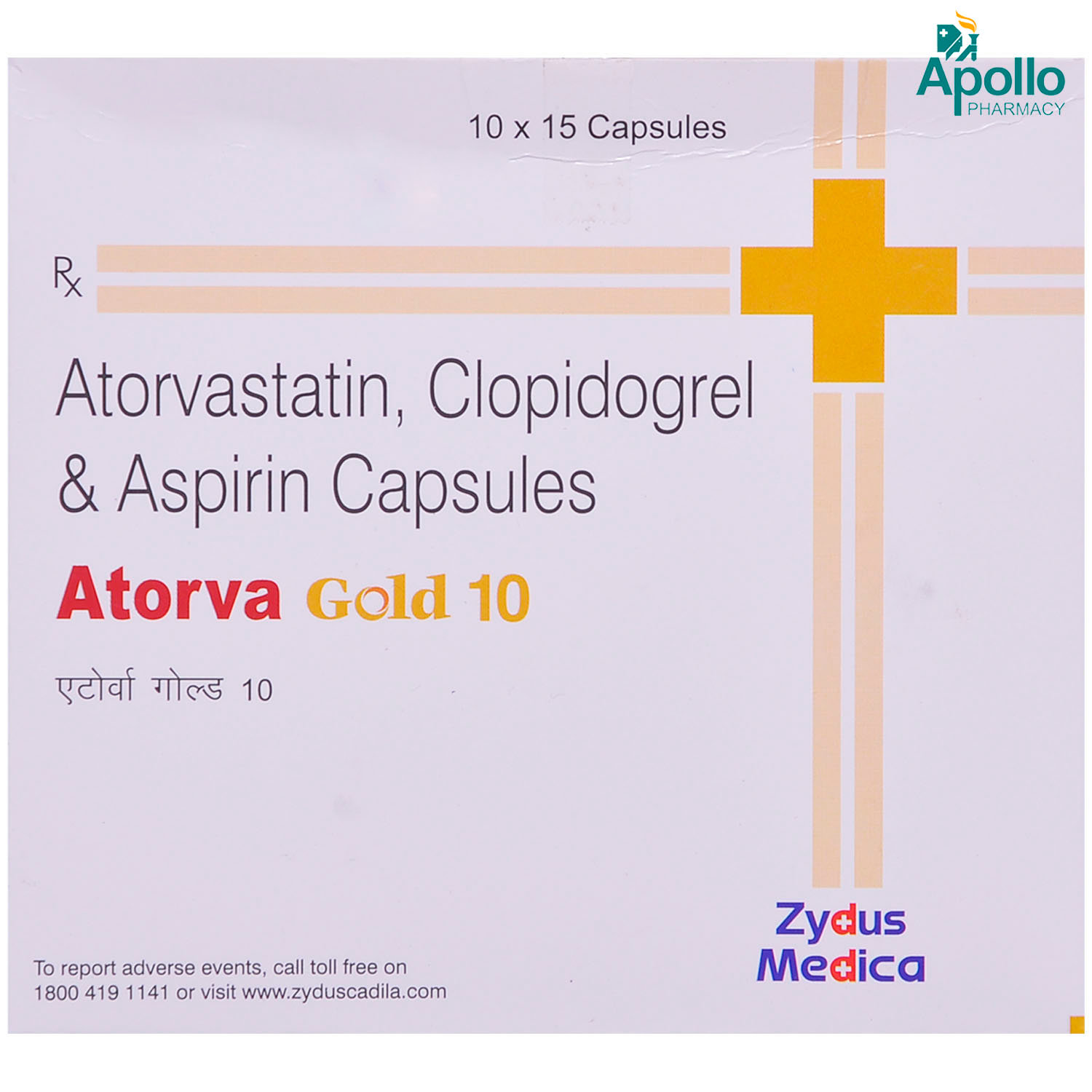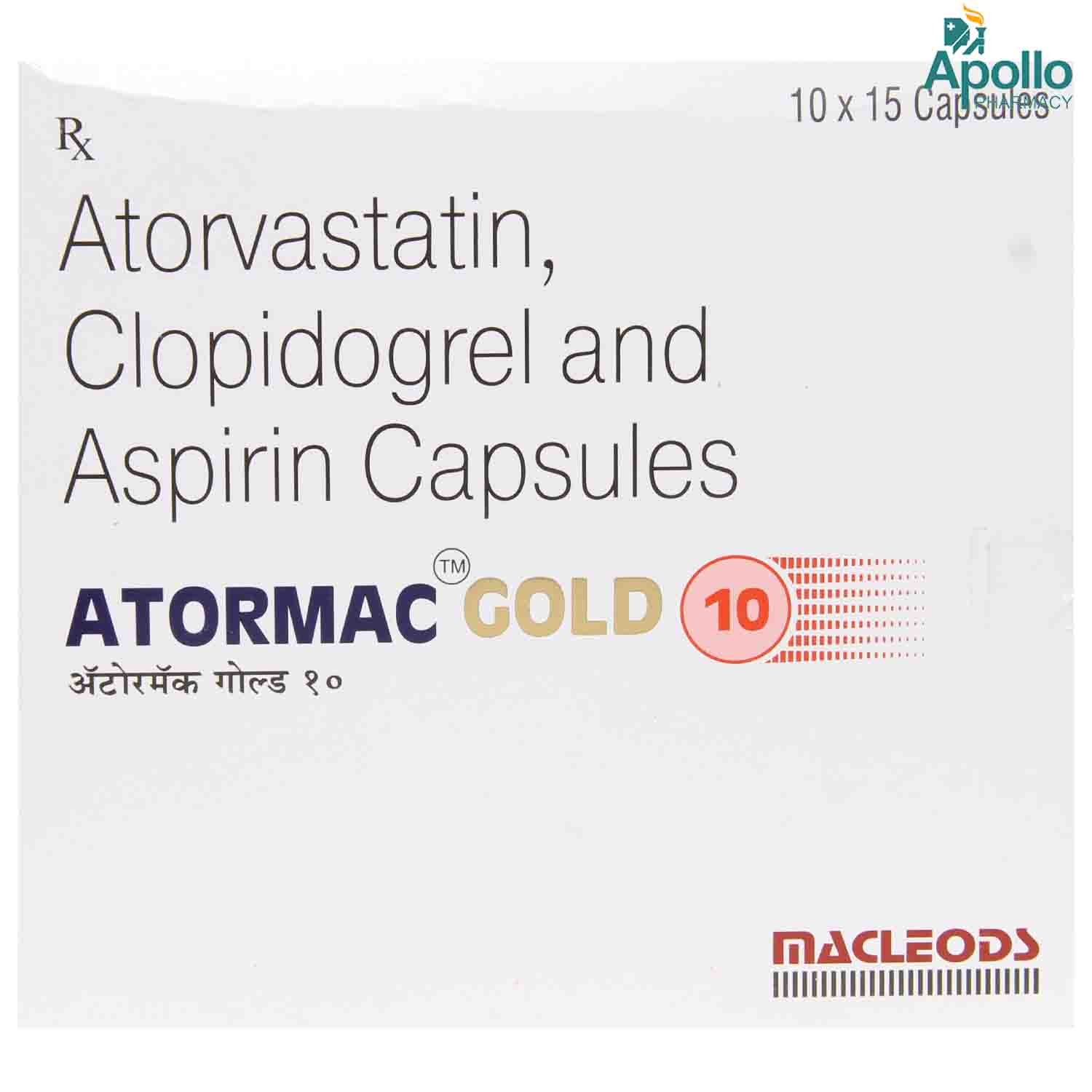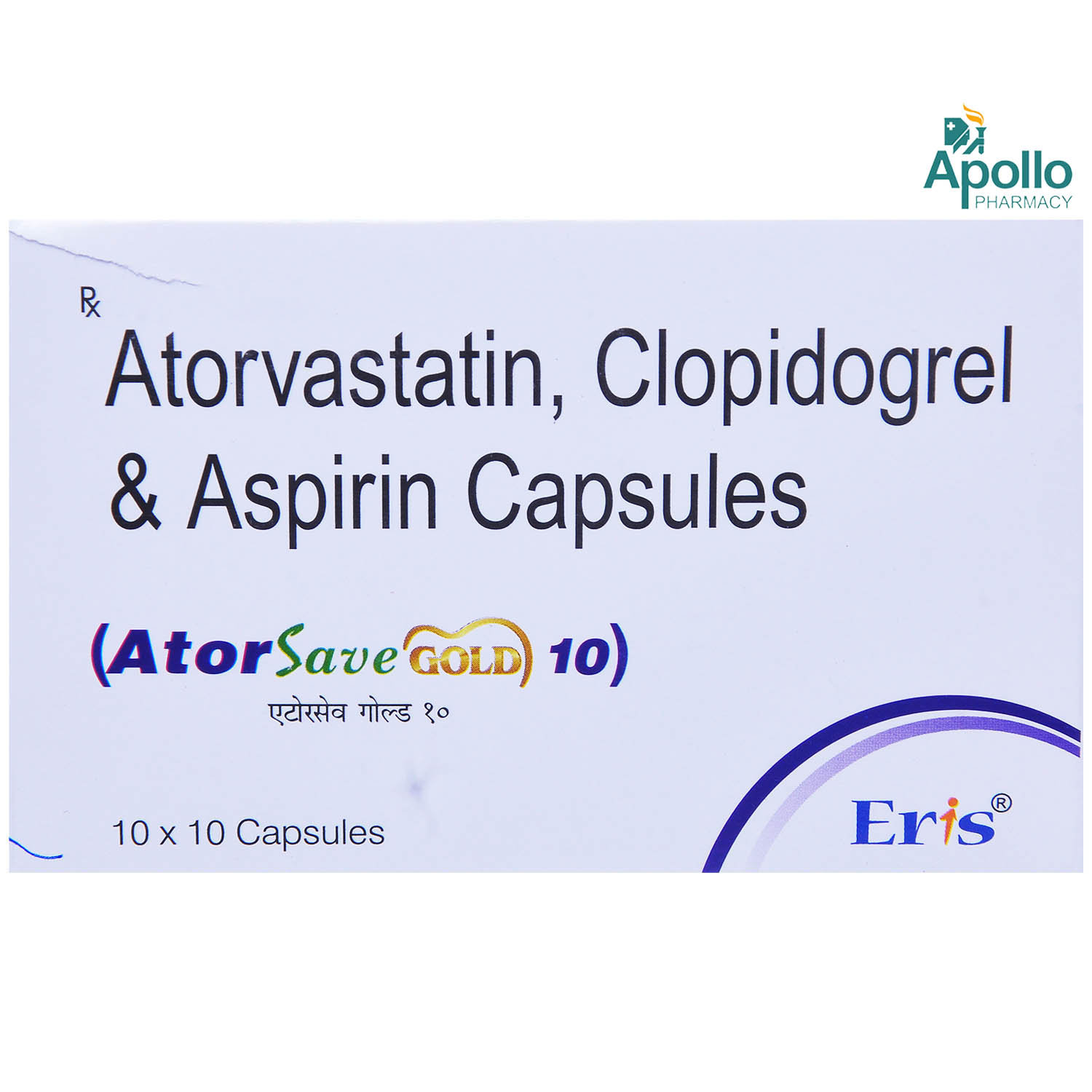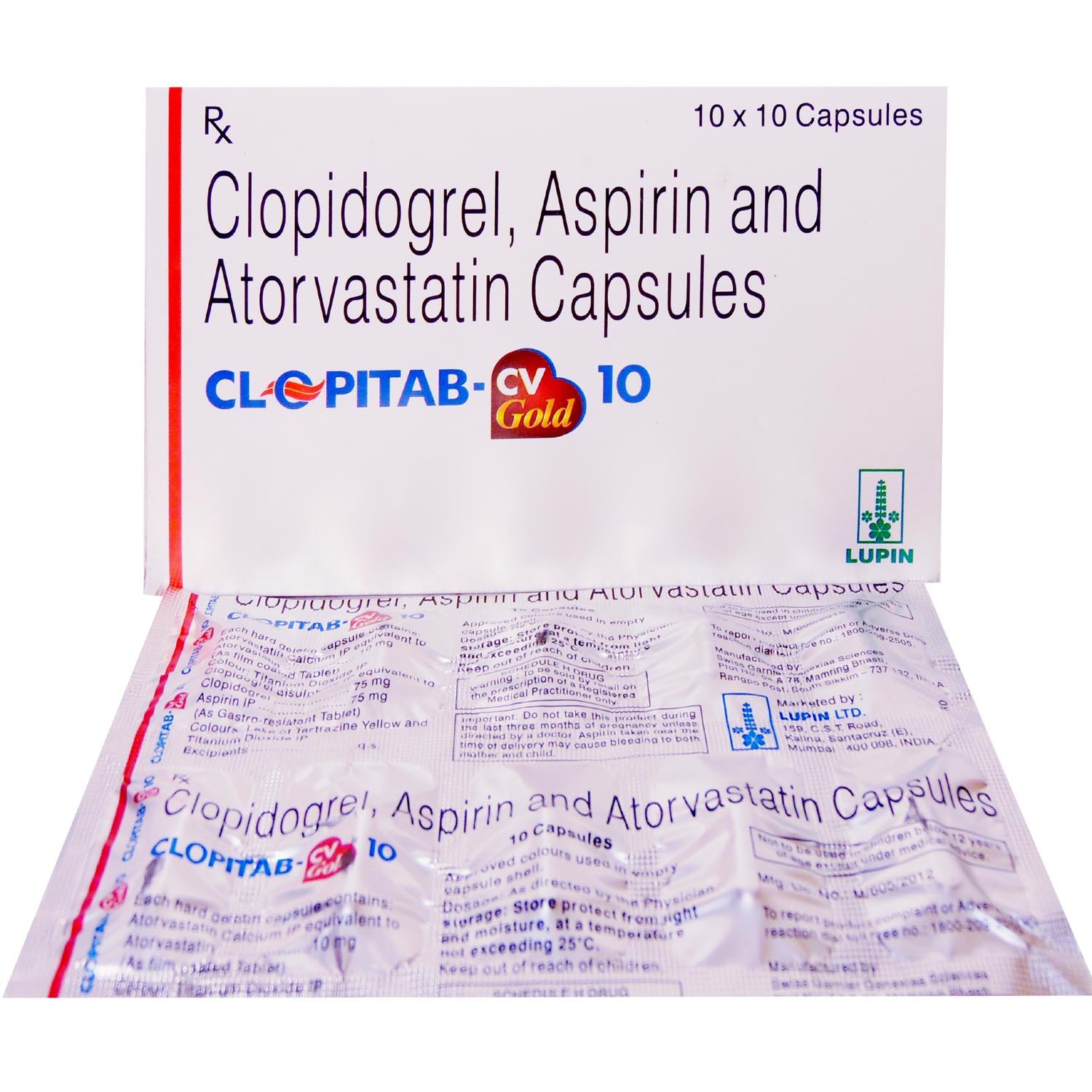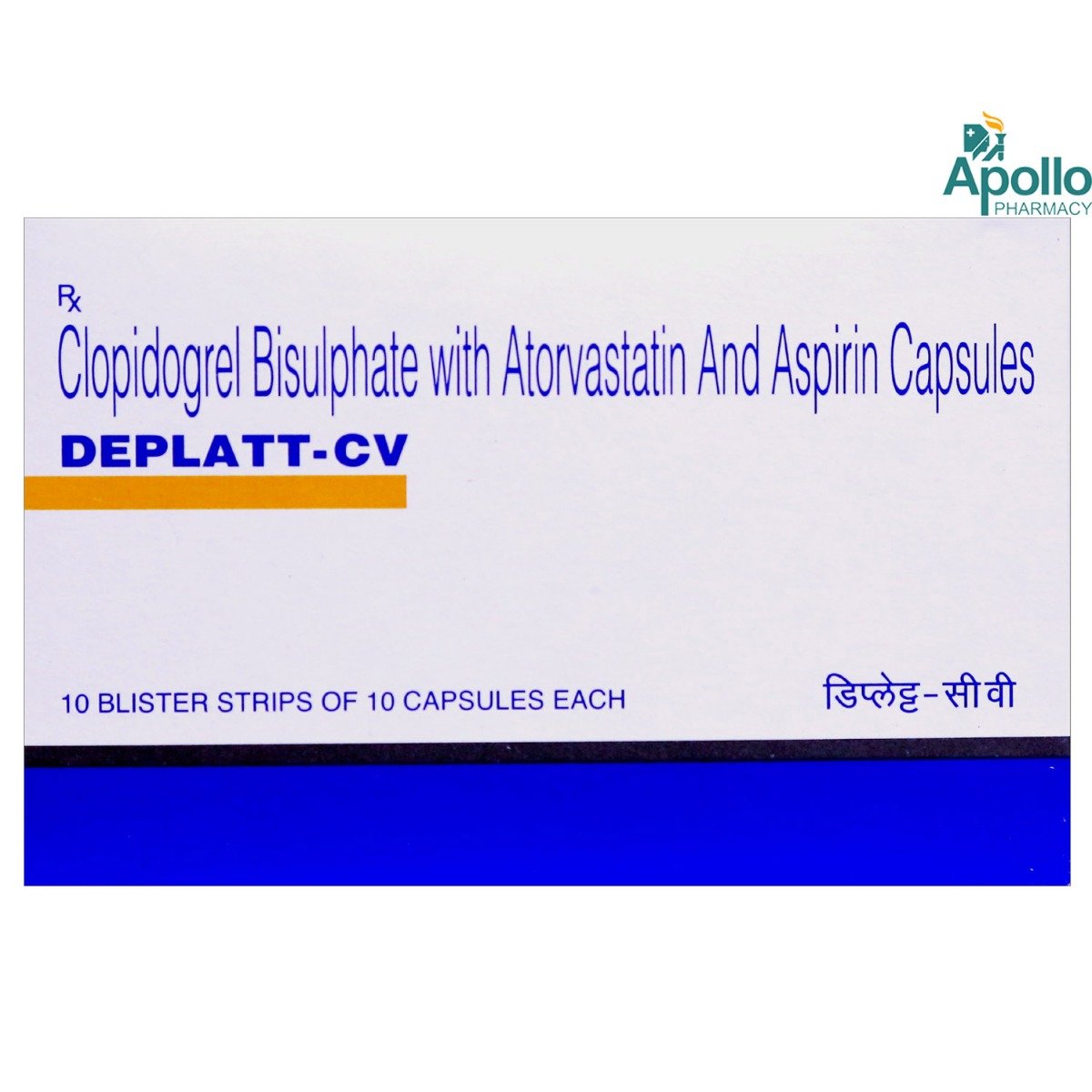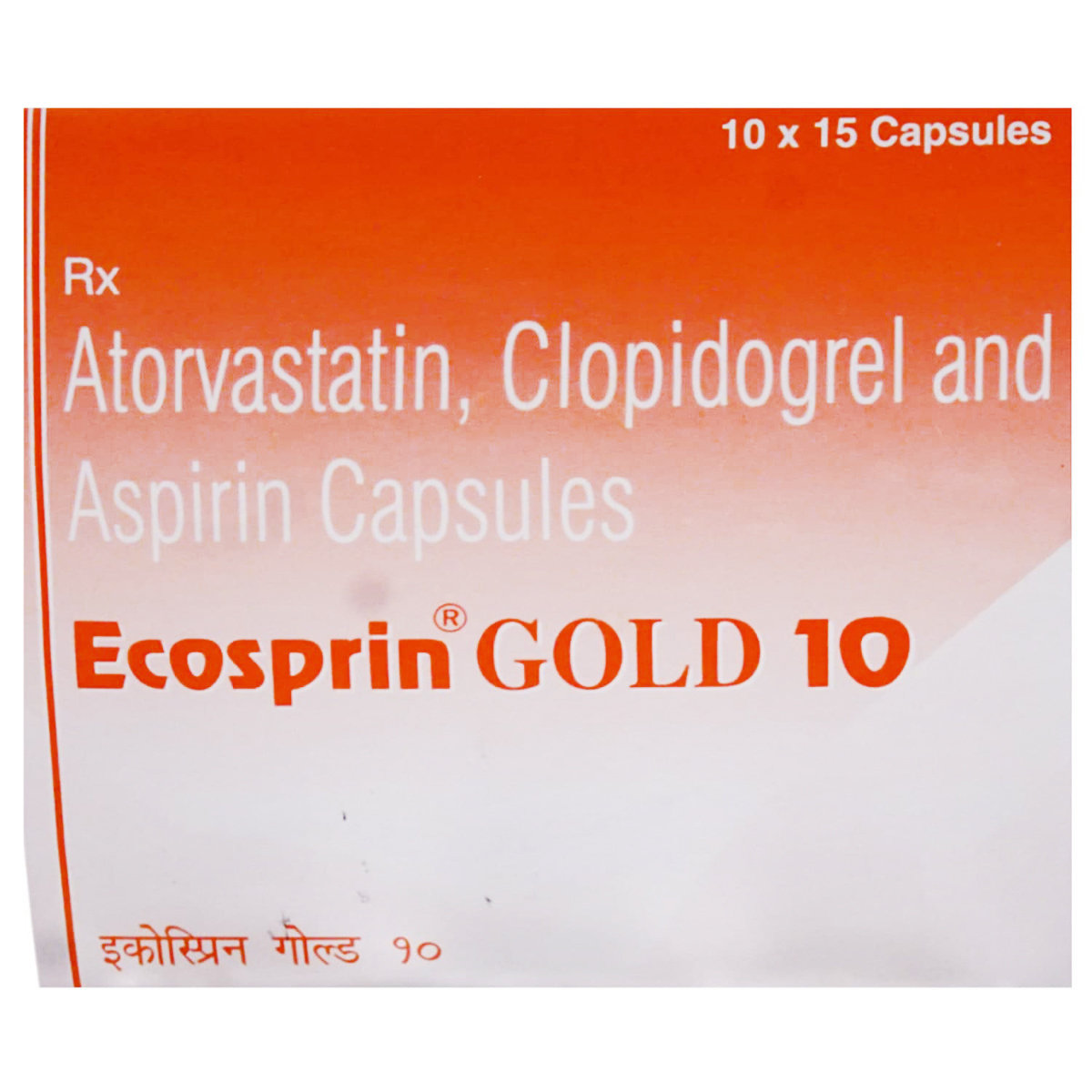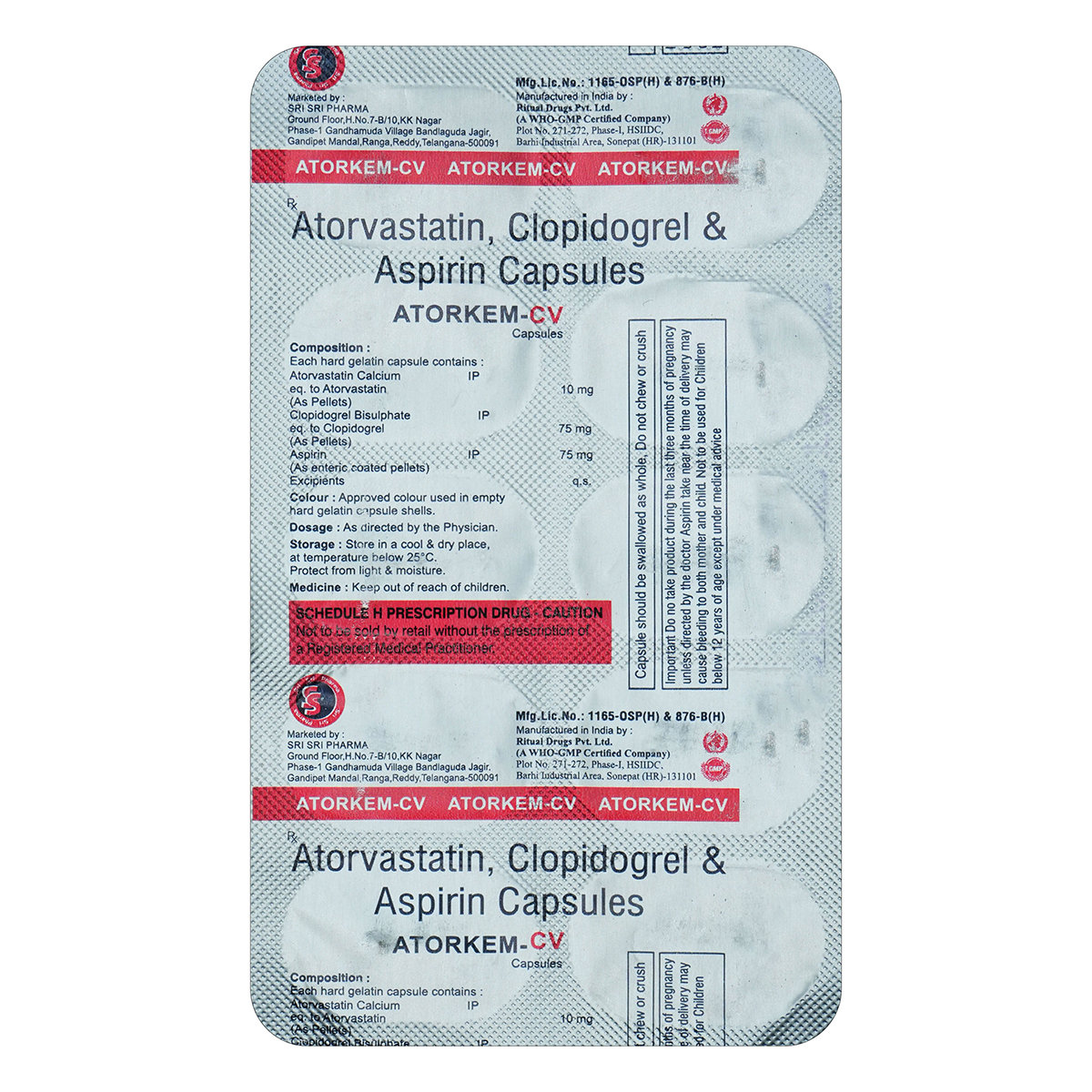Clavix Gold-10 Capsule 15's
MRP ₹92
(Inclusive of all Taxes)
₹13.8 Cashback (15%)
Provide Delivery Location
Online payment accepted
 Prescription drug
Prescription drugWhats That
Composition :
Manufacturer/Marketer :
Consume Type :
Expires on or after :
Return Policy :
About Clavix Gold-10 Capsule
Clavix Gold-10 Capsule is a combination drug of blood-thinning agents and cholesterol-lowering agents, primarily taken for the prevention of heart attack and stroke. It also lowers the raised level of cholesterol in our body. A heart attack generally refers to a blocked flow of blood to the heart due to the blockage of arteries. The blockage is most often a buildup of fat, cholesterol and other substances, which form a plaque in the arteries that feed the heart (coronary arteries).
Clavix Gold-10 Capsule is composed of three medicines namely: Atorvastatin, Clopidogrel and Aspirin. Atorvastatin is a lipid-lowering medication that blocks the enzyme required to make cholesterol in the body. It reduces the bad cholesterol (also known as low-density lipoproteins or LDL), triglycerides (TG) and increases the levels of good cholesterol (also known as high-density lipoproteins or HDL). Clopidogrel and Aspirin are blood thinners (anticoagulant) that collectively prevent the formation of a clot in the blood vessels. It also helps to reduce the increased levels of bad cholesterol (low-density lipoprotein and triglycerides). Together Clavix Gold-10 Capsule help to reduce the risk of heart attack, stroke and heart-related chest pain (angina).
You can take Clavix Gold-10 Capsule with food or without food. It should be swallowed whole with a glass of water. Do not chew, bite, or break it. Your doctor will advise you how often you take Clavix Gold-10 Capsule based on your medical condition. In some cases, you may experience headaches, dizziness, ankle swelling (oedema), slow heart rate, diarrhoea, and nausea. Most of these side effects of Clavix Gold-10 Capsule do not require medical attention and gradually resolve over time. However, if the side effects are persistent, reach out to your doctor.
Try not to stop taking this medicine of your own. Stopping Clavix Gold-10 Capsule abruptly may worsen your condition and increase your risk of a future heart attack. Let your doctor know if are sensitive to atorvastatin, clopidogrel or aspirin, have any active liver disease, active bleeding issues (like peptic ulcer, brain haemorrhage), muscle problem (myopathy, rhabdomyolysis), pregnant or planning to become pregnant or breastfeeding. The patient should inform the doctor that they are taking Clavix Gold-10 Capsule before any surgery is scheduled or any new medicine is taken. Atorvastatin present in Clavix Gold-10 Capsule is a pregnancy category X drug so it is contraindicated in pregnant women. As it may cause harm to the fetus if administered to a pregnant woman. Clavix Gold-10 Capsule is known to cause dizziness, so driving should be avoided.
Uses of Clavix Gold-10 Capsule
Directions for Use
Key Benefits
Clavix Gold-10 Capsule is composed of three medicines namely: Atorvastatin (lipid or cholesterol-lowering medicine), Aspirin (analgesic and anticoagulant) and Clopidogrel (anticoagulant). Together they help in lowering increased bad cholesterol (low-density lipoprotein - LDL) and raise good cholesterol (high-density lipoprotein - HDL). This, in turn, prevents the formation of blood clots and plaque (cholesterol) deposited in the walls of heart arteries thereby minimizing the risk of cardiovascular heart diseases like heart attack and stroke.
Storage
- Inform Your Doctor: Notify your doctor immediately about your diarrhoea symptoms. This allows them to adjust your medication or provide guidance on managing side effects.
- Stay Hydrated: Drink plenty of fluids to replace lost water and electrolytes. Choose water, clear broth, and electrolyte-rich drinks. Avoid carbonated or caffeinated beverages to effectively rehydrate your body.
- Follow a Bland Diet: Eat easy-to-digest foods to help firm up your stool and settle your stomach. Try incorporating bananas, rice, applesauce, toast, plain crackers, and boiled vegetables into your diet.
- Avoid Trigger Foods: Steer clear of foods that can worsen diarrhoea, such as spicy, fatty, or greasy foods, high-fibre foods, and dairy products (especially if you're lactose intolerant).
- Practice Good Hygiene: Maintain good hygiene to prevent the spread of infection. To stay healthy, wash your hands frequently, clean and disinfect surfaces regularly, and avoid exchanging personal belongings with others.
- Take Anti-Diarrheal Medications: If your doctor advises, anti-diarrheal medications such as loperamide might help manage diarrhoea symptoms. Always follow your doctor's directions.
- Keep track of your diarrhoea symptoms. If they don't get better or worse or are accompanied by severe stomach pain, blood, or dehydration signs (like extreme thirst or dark urine), seek medical help.
- If you experience signs of skin allergies such as redness, itching, or irritation after taking medication, contact your doctor right away.
- To alleviate skin allergy symptoms, your doctor may change your medication regimen or offer tailored medication management advice.
- Your doctor may recommend or prescribe drugs to relieve discomfort.
- Cool compresses or calamine lotion can help relieve redness and itching on the afflicted skin area.
- Staying hydrated by consuming plenty of water can help relieve discomfort.
- Monitor your skin condition closely and promptly report any changes, worsening symptoms, or concerns to your healthcare provider.
- Get enough sleep. Maintain a regular sleep cycle.
- Eat a healthy diet and exercise regularly.
- Manage stress with yoga or meditation.
- Limit alcohol and caffeine.
- Avoid driving or operating machinery unless you are alert.
- Hydrate your body: Drink enough water to prevent dehydration and headaches.
- Calm Your Mind: Deep breathing and meditation can help you relax and relieve stress.
- Rest and Recharge: Sleep for 7-8 hours to reduce headache triggers.
- Take rest: lie down in a quiet, dark environment.
- Cold or warm compresses can help reduce tension.
- Stay Upright: Maintain good posture to keep symptoms from getting worse.
- To treat headaches naturally, try acupuncture or massage therapy.
- Over-the-counter pain relievers include acetaminophen and ibuprofen.
- Prescription Assistance: Speak with your doctor about more substantial drug alternatives.
- Severe Headaches: Seek emergency medical assistance for sudden, severe headaches.
- Frequent Headaches: If you get reoccurring headaches, consult your doctor.
- Headaches with Symptoms: Seek medical attention if your headaches include fever, disorientation, or weakness.
- Take medications with food (if recommended): It can help prevent stomach distress and indigestion.
- Eat smaller, more frequent meals: Divide daily food intake into smaller, more frequent meals to ease digestion.
- Avoid trigger foods: Identify and avoid foods that trigger indigestion, such as spicy, fatty, or acidic foods.
- Stay upright after eating: Sit or stand upright for at least 1-2 hours after eating to prevent stomach acid from flowing into the oesophagus.
- Avoid carbonated drinks: Avoid drinking carbonated beverages, such as soda or beer, which can worsen indigestion.
- Manage stress: To alleviate indigestion, engage in stress-reducing activities like deep breathing exercises or meditation.
- Consult a doctor if needed: If indigestion worsens or persists, consult a healthcare professional to adjust the medication regimen or explore alternative treatments.
- Inform your doctor about the nausea and discuss possible alternatives to the medication or adjustments to the dosage.
- Divide your daily food intake into smaller, more frequent meals to reduce nausea.
- Opt for bland, easily digestible foods like crackers, toast, plain rice, bananas, and applesauce.
- Avoid certain foods that can trigger nausea, such as fatty, greasy, spicy, and smelly foods.
- Drink plenty of fluids, such as water, clear broth, or electrolyte-rich beverages like coconut water or sports drinks.
- Use ginger (tea, ale, or candies) to help relieve nausea.
- Get adequate rest and also avoid strenuous activities that can worsen nausea.
- Talk to your doctor about taking anti-nausea medication if your nausea is severe.
- Record when your nausea occurs, what triggers it, and what provides relief to help you identify patterns and manage your symptoms more effectively.
- Tell your doctor about your GAS symptoms. They may change your medication regimen or prescribe additional drugs to help you manage them.
- To manage GAS symptoms, eat a balanced diet of fibre, vegetables, and fruits.
- Drink enough water throughout the day to avoid constipation and treat GAS symptoms.
- Regular exercise like yoga and walking may help stimulate digestion and alleviate GAS symptoms.
- Take probiotics only if your doctor advises, as they may help alleviate GAS symptoms by promoting gut health.
- Take medication for GAS symptoms only if your doctor advises, as certain medications can interact with your existing prescriptions or worsen symptoms.
- If symptoms persist, worsen, or are accompanied by severe abdominal pain, vomiting, or bleeding, seek immediate medical attention.
Drug Warnings
Let your doctor know if are sensitive to atorvastatin, clopidogrel or aspirin, have any active liver disease, active bleeding issues (like peptic ulcer, brain haemorrhage), pregnant or planning to become pregnant or breastfeeding. The patient should inform the doctor that they are taking Clavix Gold-10 Capsule before any surgery is scheduled or any new medicine is taken. Atorvastatin present in Clavix Gold-10 Capsule is a pregnancy category X drug so it is contraindicated in pregnant women. Clavix Gold-10 Capsule contains Atorvastatin which can cause muscle problems like myopathy and rhabdomyolysis. The safety and effectiveness of Clavix Gold-10 Capsule have not been established, so its use should be avoided in pediatric patients or children less than 12 years of age. Abrupt discontinuation of Clavix Gold-10 Capsule may lead to the occurrence of cardiovascular events like heart attack, stroke and angina (heart-related chest pain). Hence, you should consult a doctor before stopping the dose of Clavix Gold-10 Capsule .
Drug-Drug Interactions
Drug-Drug Interactions
Login/Sign Up
Co-administration of Ketorolac and Clavix Gold-10 Capsule may increase the risk of side effects.
How to manage the interaction:
Taking Ketorolac with Clavix Gold-10 Capsule is not recommended but can be taken together if prescribed by a doctor. However, consult a doctor if you experience unusual bleeding or bruising, dizziness, tarry stools, coughing up or vomiting fresh or dried blood, severe headache and weakness. Do not stop using any medications without talking to a doctor.
Combining Ketorolac tromethamine with Clavix Gold-10 Capsule can increase the risk of adverse effects.
How to manage the interaction:
Taking Clavix Gold-10 Capsule with Ketorolac tromethamine is not recommended, as it results in an interaction, it can be taken if advised by a doctor. Do not stop using any medications without a doctor’s advice.
Taking Clavix Gold-10 Capsule together with mifepristone increases the risk of vaginal bleeding in women.
How to manage the interaction:
Although taking Clavix Gold-10 Capsule with mifepristone is not recommended, that would certainly result in interaction, it can be taken if a doctor prescribes it. If you experience prolonged and heavy bleeding, consult a doctor immediately. Do not discontinue any medication without consulting a doctor.
When Selexipag and Clavix Gold-10 Capsule are taken together, the body's ability to break down Selexipag may be reduced.
How to manage the interaction:
Taking Clavix Gold-10 Capsule with Selexipag is not recommended, please consult your doctor before taking it. They can be taken if prescribed by your doctor.
Taking Clavix Gold-10 Capsule with Posaconazole can increase the blood levels of Clavix Gold-10 Capsule. This can increase the risk of side effects.
How to manage the interaction:
Although there is an interaction between posaconazole with Clavix Gold-10 Capsule, they can be taken together if advised by your doctor. However, contact the doctor if you experience unexplained muscle pain, weakness, fever, chills, joint pain or swelling, unusual bleeding, skin rash, itching, loss of appetite, fatigue, nausea, vomiting, dark coloured urine, or yellowing of the skin or eyes. Do not discontinue any medications without consulting a doctor.
The use of panobinostat with Clavix Gold-10 Capsule may increase the risk of bleeding.
How to manage the interaction:
Taking panobinostat with Clavix Gold-10 Capsule together can possibly result in an interaction, but it can be taken if your doctor has advised it. However, if you experience unusual bleeding or bruising, dizziness, lightheadedness, red or black, tarry stools, coughing up or vomiting fresh or dried blood that looks like coffee grounds, severe headache, and weakness, consult the doctor. Do not stop using any medications without a doctor's advice.
Using warfarin together with Dicoumarol may cause you to bleed more easily.
How to manage the interaction:
Taking Clavix Gold-10 Capsule with Dicoumarol together can result in an interaction, but it can be taken if a doctor has advised it. If you notice any bleeding, it's important to contact a doctor right away. They will be able to help you and provide the necessary care. Do not discontinue any medications without consulting a doctor.
Coadministration of Clavix Gold-10 Capsule and Teriflunomide can enhance the risk of liver problems.
How to manage the interaction:
Although co-administration of Clavix Gold-10 Capsule with teriflunomide can lead to an interaction, it can be taken if recommended by a doctor. If you experience fever, chills, joint pain or swelling, unusual bleeding or bruising, skin rash, itching, loss of appetite, fatigue, nausea, vomiting, abdominal pain, dark colored urine, light colored stools, and/or yellowing of the skin or eyes, contact a doctor right away. Do not discontinue any medications without consulting a doctor.
Using Clavix Gold-10 Capsule together with deflazacort may increase the risk of gastric and intestinal ulcers, bleeding and perforation.
How to manage the interaction:
Co-administration of Clavix Gold-10 Capsule with Deflazacort can result in an interaction, but it can be taken if a doctor has advised it. If you have any symptoms unusual bleeding or bruising, dizziness, lightheadedness, red or black, tarry stools, coughing up or vomiting fresh or dried blood that looks like coffee grounds, severe headache, and weakness, consult a doctor. Do not stop using any medications without consulting a doctor.
Using Clavix Gold-10 Capsule together with tirofiban can cause you to bleed more easily.
How to manage the interaction:
Co-administration of Clavix Gold-10 Capsule with Tirofiban can result in an interaction, but it can be taken if a doctor has advised it. If you notice any of these signs, it's important to contact a doctor right away: bleeding, bruising, throwing up, headache, feeling dizzy, weakness, or seeing blood in your urine or stools. Do not stop using any medications without talking to a doctor.
Drug-Food Interactions
Drug-Food Interactions
Login/Sign Up
Diet & Lifestyle Advise
- A low cholesterol diet along with a regular exercise regime is recommended.
- As a precautionary measure, you are recommended not to consume alcohol, junk food items from outside, stick to a freshly prepared home-cooked meal and take proper rest, for a speedy recovery.
- And also try to replace most of your saturated fats with unsaturated fats can reduce total cholesterol and bad cholesterol (LDL cholesterol) in a short span of time.
- Foods like avocados, olive oil, fatty fish and nuts contain lots of heart-healthy unsaturated fats, so it’s beneficial to eat them regularly.
Side Effects of Clavix Gold-10 Capsule
- Headache
- Dizziness
- Ankle swelling (oedema)
- Slow heart rate
- Diarrhoea
- Nausea
Habit Forming
Therapeutic Class
All Substitutes & Brand Comparisons
RX
Avas Gold 10 Capsule 10's
Micro Labs Ltd
₹51
(₹4.59 per unit)
16% CHEAPERRX
Stator Gold 10/75/75Mg Capsule 15's
Abbott India Ltd
₹89.5
(₹5.37 per unit)
2% CHEAPERRX
Lipicure Gold 10 Capsule 15's
Intas Pharmaceuticals Ltd
₹92
(₹5.52 per unit)
Drug-Diseases Interactions
Drug-Diseases Interactions
Login/Sign Up
FAQs
Drug-Drug Interactions Checker List
- CLARITHROMYCIN
- RITONAVIR
- LOPINAVIR
- DARUNAVIR
- ATAZANAVIR
- INDINAVIR
- ITRACONAZOLE
- WARFARIN
- HEPARIN
- COLCHICINE
- DIGOXIN
- CYCLOSPORINE
Disease/Condition Glossary
Atherosclerosis occurs when fats, cholesterol, and other substances known as plaque deposits on your artery walls that restrict blood flow. This plaque formation triggers blood clot, narrow the arteries size, and makes it hardened. This in turn can lead to various heart complications like atherosclerosis, heart attack, heart-related chest pain (angina), and stroke. However, it can also affect the arteries of the body apart from the heart.

Have a query?
Alcohol
Safe if prescribed
Clavix Gold-10 Capsule should not be taken until prescribed if you are taking alcohol. Keep your doctor informed if you drink alcohol.
Pregnancy
Consult your doctor
Clavix Gold-10 Capsule contains Atorvastatin which is a pregnancy category X medicine. It may cause harm to both the pregnant mother and the fetus. Hence, it is not recommended for pregnant women and those who are planning for a pregnancy. Your doctor might prescribe you only in an extreme case.
Breast Feeding
Consult your doctor
Take Clavix Gold-10 Capsule only when prescribed, it is known to pass on in a limited quantity via breast milk to the child.
Driving
Safe if prescribed
Drive with caution, Clavix Gold-10 Capsule usually causes blurry vision and may affect driving ability.
Liver
Consult your doctor
Clavix Gold-10 Capsule to be taken with caution, especially if you have a history of liver diseases/conditions. The dose may have to be adjusted by your doctor.
Kidney
Consult your doctor
Clavix Gold-10 Capsule to be taken with caution, especially if you have a history of Kidney diseases/conditions. The dose may have to be adjusted by your doctor.
Children
Safe if prescribed
Clavix Gold-10 Capsule is not recommended for children below the age of 16 years. The safety and effectiveness of Clavix Gold-10 Capsule have not been established in children due to limited testing of this drug on children by competent authorities across the world.
Recommended for a 30-day course: 2 Strips

